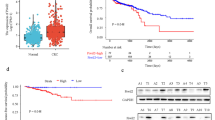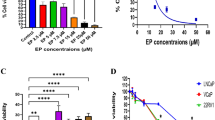Abstract
Colorectal cancer (CRC) is the leading cause of cancer deaths worldwide, wherein distant metastasis is the main reason for death. The non-psychoactive phytocannabinoid cannabidiol (CBD) effectively induces the apoptosis of CRC cells. We investigated the role of CBD in the migration and metastasis of CRC cells. CBD significantly inhibited proliferation, migration, and invasion of colon cancer cells in a dose- or time-dependent manner. CBD could also inhibit epithelial–mesenchymal transition (EMT) by upregulating epithelial markers such as E-cadherin and downregulating mesenchymal markers such as N-cadherin, Snail, Vimentin, and HIF-1α. CBD could suppress the activation of the Wnt/β-catenin signaling pathway, inhibit the expression of β-catenin target genes such as APC and CK1, and increase the expression of Axin1. Compared to the control group, the volume and weight of orthotopic xenograft tumors significantly decreased after the CBD treatment. The results demonstrated that CBD inhibits invasion and metastasis in CRC cells. This was the first study elucidating the underlying molecular mechanism of CBD in inhibiting EMT and metastasis via the Wnt/β-catenin signaling pathway in CRC cells. The molecular mechanism by which CBD inhibits EMT and metastasis of CRC cells was shown to be through the Wnt/β-catenin signaling pathway for the first time.







Similar content being viewed by others
References
Ashihara E, Takada T, Maekawa T (2015) Targeting the canonical Wnt/beta-catenin pathway in hematological malignancies. Cancer Sci 106(6):665–671
Chen WR, Zheng PD, Baade S et al (2016) Cancer statistics in China. Cancer J Clin 66:115–132
Chen S, Deng C, Zheng W et al (2021) Cannabidiol effectively promoted cell death in bladder cancer and the improved intravesical adhesion drugs delivery strategy could be better used for treatment. Pharmaceutics 13(9):1415
Clevers H (2006) Wnt/beta-catenin signaling in development and disease. Cell 127:469–480
Gonzalez DM, Medici D (2014) Signaling mechanisms of the epithelial-mesenchymal transition. Sci Signal 7(344):re8
Guo K, Zhang Y, Liu L et al (2021) LncRNA SNHG12 promotes the development and progression of colon cancer by regulating the miR-15a/PDK4 axis. Am J Transl Res 13(9):10233–10247
Inkol JM, Hocker SE, Mutsaers AJ (2021) Combination therapy with cannabidiol and chemotherapeutics in canine urothelial carcinoma cells. PLoS ONE 16(8):e0255591
Jeong S, Yun HK, Jeong YA et al (2019) Cannabidiol-induced apoptosis is mediated by activation of noxa in human colorectal cancer cells. Cancer Lett 447:12–23
Jeong S, Jo MJ, Yun HK et al (2019) Cannabidiol promotes apoptosis via regulation of XIAP/Smac in gastric cancer. Cell Death Dis 10(11):846
Ji C, Yang L, Yi W et al (2018) Capillary morphogenesis gene 2 maintains gastric cancer stem-like cell phenotype by activating a Wnt/β-catenin pathway. Oncogene 37:3953–3966
Jo MJ, Kim BG, Kim WY et al (2021) Cannabidiol suppresses angiogenesis and stemness of breast cancer cells by downregulation of hypoxia-inducible factors-1 alpha. Cancers (Basel) 13(22):5667
Kong D, Banerjee S, Ahmad A et al (2010) Epithelial to mesenchymal transition is mechanistically linked with stem cell signatures in prostate cancer cells. PLoS ONE 5:e12445
Lambert AW, Pattabiraman DR, Weinberg RA (2017) Emerging biological principles of metastasis. Cell 168(4):670–691
Li H, Rokavec M, Jiang L et al (2017) Antagonistic effects of p53 and HIF1A on microRNA-34a regulation of PPP1R11 and STAT3 and hypoxia-induced epithelial to mesenchymal transition in colorectal cancer cells. Gastroenterology 153(2):505–520
Li C, Gao S, Li XP et al (2018) Procaine inhibits the proliferation and migration of colon cancer cells through inactivation of the ERK/MAPK/FAK pathways by regulation of RhoA. Oncol Res 26(2):209–217
Li Q, Lai Q, He C et al (2019) RUNX1 promotes tumour metastasis by activating the Wnt/beta-catenin signalling pathway and EMT in colorectal cancer. J Exp Clin Cancer Res 38(1):334
Li G, Zhang C, Liang W et al (2021) Berberine regulates the Notch1/PTEN/PI3K/AKT/mTOR pathway and acts synergistically with 17-AAG and SAHA in SW480 colon cancer cells. Phram Biol 59(1):21–30
Lindsey S, Langhans SA (2014) Crosstalk of oncogenic signaling pathways during epithelial-mesenchymal transition. Front Oncol 4:358
Liu C, Li Y, Semenov M, Han C, Baeg GH, Tan Y, Zhang Z, Lin X, He X (2002) Control of β-catenin phosphorylation/ degradation by a dual-kinase mechanism. Cell 108:837–847
Meyerhardt JA, Mayer RJ (2005) Systemic therapy for colorectal cancer. N Engl J Med 352:476–487
Milian L, Mata M, Alcacer J et al (2020) Cannabinoid receptor expression in non-small cell lung cancer. Effectiveness of tetrahydrocannabinol and cannabidiol inhibiting cell proliferation and epithelial-mesenchymal transition in vitro. PLoS ONE 15(2):e0228909
Pertwee RG (2008) The diverse CB 1 and CB 2 receptor pharmacology of three plant cannabinoids: D9 –tetrahydrocannabinol, cannabidiol and D9 –tetrahydrocannabivarin. Br J Pharmacol 153:199–215
Pietrovito L, Iozzo M, Bacci M et al (2020) Treatment with cannabinoids as a promising approach for impairing fibroblast activation and prostate cancer progression. Int J Mol Sci 21(3):787
Pisanti S, Malfitano AM, Ciaglia E et al (2017) Cannabidiol: state of the art and new challenges for therapeutic applications. Pharmacol Ther 175:133–150
Ramer R, Hinz B (2017) Cannabinoids as anticancer drugs cannabinoid pharmacology. Adv Pharmacol 80:397–436
Rezaei R, Baghaei K, Amani D et al (2021) Exosome-mediated delivery of functionally active miRNA-375-3p mimic regulate epithelial mesenchymal transition (EMT) of colon cancer cells. Life Sci 269:119035
Roche J (2018) The epithelial-to-mesenchymal transition in cancer. Cancers 10(2):52
Sakuma K, Sasaki E, Kimura K et al (2018) HNRNPLL, a newly identified colorectal cancer metastasis suppressor, modulates alternative splicing of CD44 during epithelial-mesenchymal transition. Gut 67(6):1103–1111
Sánchez-Tilló E et al (2011) β-catenin/TCF4 complex induces the epithelial-to-mesenchymal transition (EMT)-activator ZEB1 to regulate tumor invasiveness. Proc Natl Acad Sci U S A 108(48):19204–19209
Sultan AS, Marie MA, Sheweita SA (2018) Novel mechanism of cannabidiol-induced apoptosis in breast cancer cell lines. Breast 41:34–41
Tian S, Peng P, Li J et al (2020) SERPINH1 regulates EMT and gastric cancer metastasis via the Wnt/beta-catenin signaling pathway. Aging (Albany NY) 12(4):3574–3593
Wang Z, Wang L, Shi B et al (2021) Dimethylene berberine promotes apoptosis and suppresses TGF-beta/Smads induced EMT in the colon cancer cells HCT-116. Cell Biochem Funct 39(6):763–770
Xu J, Zhang Z, Shen D et al (2021) Long noncoding RNA LINC01296 plays an oncogenic role in colorectal cancer by suppressing p15 expression. J Int Med Res 49(5):3000605211004414
Yeo CD, Kang N, Choi SY et al (2017) The role of hypoxia on the acquisition of epithelial-mesenchymal transition and cancer stemness: a possible link to epigenetic regulation. Korean J Intern Med 32(4):589–599
Zhang X, Qin Y, Pan Z et al (2019) Cannabidiol induces cell cycle arrest and cell apoptosis in human gastric cancer SGC-7901 cells. Biomolecules 9(8):302
Zhang M, Du H, Wang L et al (2020) Thymoquinone suppresses invasion and metastasis in bladder cancer cells by reversing EMT through the Wnt/beta-catenin signaling pathway. Chem Biol Interact 320:109022
Acknowledgements
This work was supported by the National Natural Science Foundation of China (No. 31900987), Jiangsu Pharmaceutical Association-HengRui Hospital Pharmacy Fund (No. H202047), Development Fund of KangDa college of Nanjing medical university (No.KD2021KYJJZD127), Scientific Research Project of Nantong Municipal Health and Family Planning Commission (No. QA2021007, MB2021011, QA2021006, QA2021014), the Heilongjiang Natural Science Foundation (No. YQ2019H022), Jiangsu Province “Double Innovation Plan” (No. JSSCBS20211603)
Funding
The National Natural Science Foundation of China, (No. 31900987).
Author information
Authors and Affiliations
Contributions
PFF: conceptualization, data curation and writing-original draft preparation. LXZ: validation. JJ: validation. PXY: validation. NS: software and validation. XFC: data curation. XC: supervision.
Corresponding authors
Ethics declarations
Conflict of interest
The authors declare no competing interests.
Additional information
Publisher's Note
Springer Nature remains neutral with regard to jurisdictional claims in published maps and institutional affiliations.
Rights and permissions
Springer Nature or its licensor holds exclusive rights to this article under a publishing agreement with the author(s) or other rightsholder(s); author self-archiving of the accepted manuscript version of this article is solely governed by the terms of such publishing agreement and applicable law.
About this article
Cite this article
Feng, P., Zhu, L., Jie, J. et al. Cannabidiol inhibits invasion and metastasis in colorectal cancer cells by reversing epithelial–mesenchymal transition through the Wnt/β-catenin signaling pathway. J Cancer Res Clin Oncol 149, 3587–3598 (2023). https://doi.org/10.1007/s00432-022-04265-x
Received:
Accepted:
Published:
Issue Date:
DOI: https://doi.org/10.1007/s00432-022-04265-x




